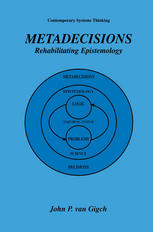

Most ebook files are in PDF format, so you can easily read them using various software such as Foxit Reader or directly on the Google Chrome browser.
Some ebook files are released by publishers in other formats such as .awz, .mobi, .epub, .fb2, etc. You may need to install specific software to read these formats on mobile/PC, such as Calibre.
Please read the tutorial at this link: https://ebookbell.com/faq
We offer FREE conversion to the popular formats you request; however, this may take some time. Therefore, right after payment, please email us, and we will try to provide the service as quickly as possible.
For some exceptional file formats or broken links (if any), please refrain from opening any disputes. Instead, email us first, and we will try to assist within a maximum of 6 hours.
EbookBell Team

4.1
90 reviewsMetadecisions: Rehabilitating Epistemology constitutes an epistemological inquiry about the foundations of knowledge of a scientific discipline. This text warns contemporary scientific disciplines that neglecting epistemological issues threatens the viability of their pronouncements and designs.
It shows that the processes by which complex artefacts are created require a pluralistic approach to artefact design.
It argues that viable solutions to fundamental problems in each discipline require cooperation, creativity and respect for contributions from all walks of life, all levels of logic and all standards of rigor - be they in the natural sciences, the social sciences, engineering sciences, management, the law or political sciences.
Several true cases, obtained from different walks of life are used to illustrate logic levels in problems and how the application of the process of modeling/metamodeling helps to conceptualize problem dysfunctions and to convert decisions into metadecisions.
Ten cases spanning subjects like Doctor Assisted Suicides (DASs), Advising Women on The Risks of Mammograms, a Deregulation Crusade, The Crash of TWA Flight 800, The Control of The World Wide Web, The Creation of the US Department of Homeland Security, among others, are used to illustrate the application of the metasystem framework to increase knowledge and meaning of fundamental problems.
The design of any human activity requires the intervention of several inquiring systems where the manager, the engineer, the scientist, the lawyer, the epistemologist, the ethicist and even the artist contribute to shape how problems in the real-world are formulated, how decisions/metadecisions to solve problems are taken, and finally, how actions are implemented.